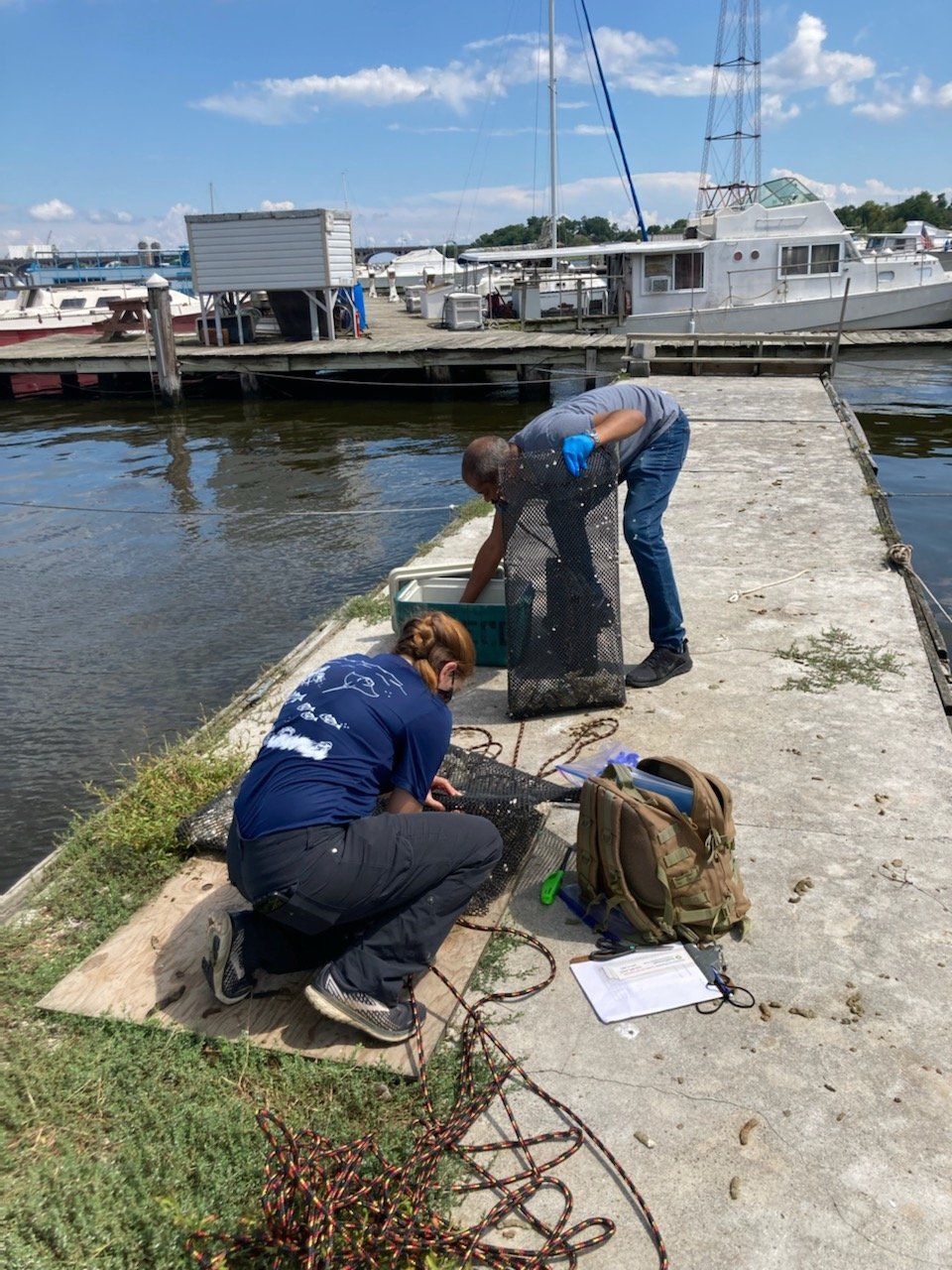EJJI Supports and Fights for Diversity in Environmental Sciences
EJJI is working with leading educational institutions and organizations to conduct research, water restoration, and educational experiences by using our wonderful site along the Middle Branch in Baltimore.
Our research partnerships include a fish species collection program, a floating wetlands installation, sessile suspension feeder research, an oyster farm prototype, and oyster research.
We also engage with partner organizations to track water and air quality data around the Middle Branch, often with the help of youth and community members.

Projects
CURRENT PROJECTS
The Patapsco River Middle Branch Fish Bounty Program
Partners: EJJI, South Baltimore Gateway Partnership, and ICARE at UMBC
Funding Source: NOAA Transformational Habitat Restoration and Coastal Resilience Grants
This project is bringing nature-based solutions to the Middle Branch of the Patapsco River for increased resiliency of the ecosystem to climate change and community connection to the river.
Reel Rewards Program
Within this restoration project, EJJI is managing the “Reel Rewards Program” where we will provide local fishers with a monetary reward in exchange for the heads of invasive species. Click here to learn more and get involved! (coming soon)
ICARE M.S. Student - Investigating the effect of the Reel Rewards program on the communities and ecosystems of Baltimore Harbor
As part of the Interdisciplinary Consortium for Applied Research in the Environment, Isabella Molatore will conduct surveys of both the ecological community in the water and the human community adjacent to the water. She will be using trawling surveys and environmental DNA methods to understand the fish populations. She will be surveying local fishers to understand the Reel Rewards program effect.
Floating Wetlands at the Middle Branch Marina
Partners: EJJI, Baltimore ToolBank, Grow Home
Through Grow Home programming and the Baltimore ToolBank's resources, we have built and deployed floating wetlands at our marina site. They will provide habitat for fish, birds, and other aquatic life and improve the water quality by filtering contaminants and removing nutrients (phosphorus and nitrogen).
Ecosystem Services of Sessile Suspension Feeders
Partners: Institute of Marine & Environmental Technology (IMET)
Led by Eric Schott, Ph.D., of IMET, this project seeks to quantify the ecosystem services of organisms, like the dark false mussel and bay barnacle, that readily settle and grow on surfaces. The Schott lab has deployed biohabitats at the Middle Branch Marina for organisms to settle on and will collect water quality data, water samples for chlorophyll a, underwater videography, and organisms for microscopic observation.
Shell Yeah!: Technology for Growing Shellfish
Shell Yeah!, recently founded by Moriah Baybrick, is a company developing practical solutions for sustainable shellfish aquaculture and restoration. They are currently conducting prototype testing at our Middle Branch Marina Site.
Contact: Moriah Baybrick, moriah@shellyeah.us
Uptake of Contaminants by Oysters
Led by Carsten Prasse, Ph.D., of Johns Hopkins University this project seeks to understand the role filter feeders can play in contaminant removal in the Baltimore Harbor. The Prasse lab currently has oysters deployed at our Middle Branch Marina site and at other locations in the Middle Branch.
Contact: Carsten Prasse, Ph.D., carsten.prasse@jhu.edu
Past Projects
ICARE M.S. Student - Research on Oysters (March – October 2022)
Thesis Title: Oyster gardening in the Baltimore Harbor: Quantifying oyster growth and influencing factors
As part of the Interdisciplinary Consortium for Applied Research in the Environment (ICARE) at UMBC, Jessica Diaz deployed oysters at our Middle Branch Marina site and at other locations in the Baltimore Harbor to establish a baseline for oyster growth. Her goal was to understand the variations in oyster growth between sites and how water quality and the oyster’s food source (phytoplankton) influenced growth.
Contact: Jessica Diaz, M.S.,
jessica.dv405@gmail.com
SERC Coastal Disease Ecology Lab (September – October 2022)
The Coastal Disease Ecology Lab at the Smithsonian Environmental Research Center deployed market-size oysters at our Middle Branch Marina site. This was part of their broader project to understand if oysters can be used to track how human pathogens are moving in the Chesapeake Bay.
Need more information? Email us at info@ejji.org
